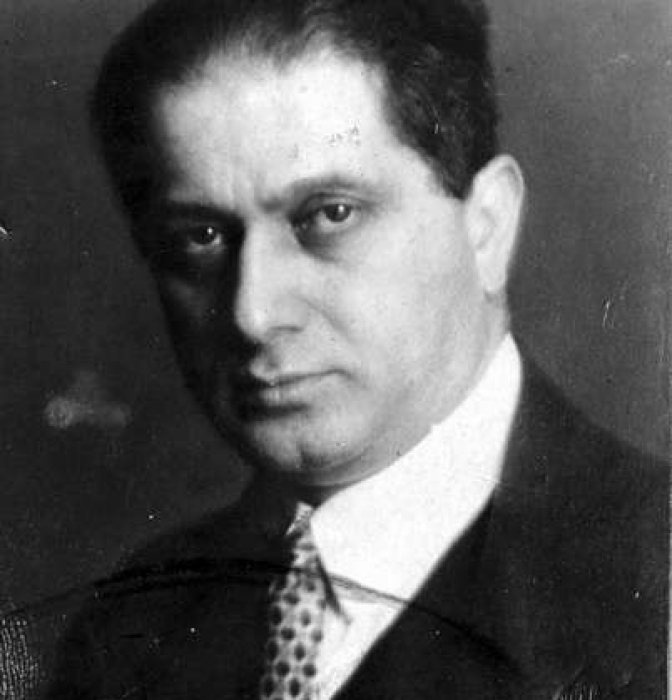
After World War I, Jewish public opinion was divided over the question of the participation of Romanian Jews in political life. The argument centered mainly on the question whether the Jews should form their own national party, which would represent them and fight for their interests, or whether they should work through the existing political framework. There was a clear distinction between the national Jewish policy of the Jews from the newly annexed provinces, and the one promoted by The Union of Native Jews (UEP), which had become the Union of Romanian Jews (UER) after the congress of 1923, and supported the latter view.
Under the influence of the communities outside the Regat, a new, strong Jewish nationalist orientation emerged. Jews opposed to assimilation pursued ethnic minority status and cultural autonomy. They were encouraged by Abraham Leib Zissu, who for several decades, advocated Jewish nationalism and a right wing Zionist ideology. Zissu was a fierce ideological opponent of Wilhelm Filderman and the UER, and by means of publications and leaflets, promoted his radical program advocating a spiritual return to Judaism and the foundation of a Jewish party.
Filderman, who become president of the UER in 1923, represented the dominant trend in the Regat that sought integration in Romanian social and political life, while preserving a Jewish identity defined in the Western, secular spirit, and believed that Jews should work through the existing political framework. On the other hand, in the communities of the newly integrated provinces, Bundist and Zionist groups were dominant, and young Jewish leaders, connected with the Zionist movement, supported the formation of a Jewish party. In Bucovina, Beno Staucher led a Jewish party whose ideology was oriented toward Jewish cultural autonomy, and Mayer Ebner, was the president of the Zionist organization of Bucovina. In Bessarabia, the Orthodox community was dominated by AgudasYisroel, led by Yehuda Leib Zirelson.
The battle of ideas between "assimilationists" supported by the UER, and Zionists continued throughout the interwar period. These two groups, led many debates on defining Jewish identity, and on confronting anti-Semitism. Horia Carp,Gabriel Schaffer, and Felix Aderca played active roles in these disputes which appeared on the pages of Jewish periodicals, especially in Curierul Israelit, which represented the orientation of the UER, and Adam review issued by Zissu's disciple, Isac Ludo.
After the adoption of the constitution in 1923, the UER tried to supervise the implementation of its provisions, and oversaw the organization of the community and religious life. Jewish schools were supported by the community, including the Tarbut network of Hebrew language schools in Bessarabia. Filderman rejected the idea of a Jewish party, favoring alliances with Romanian parties that were willing to support the claims of the UER. He believed in legal militancy, frequently resorting to petitions in parliament, and press campaigns in defense of the Jews' rights.
In 1926, the National Jewish Club was formed in Bucharest, and its members represented most of the Zionist factions. Further clubs were formed along similar lines in other towns, and these later became branches of the Jewish National Party (PER). The Jews in the newly integrated provinces were well organized in political terms, and in the elections of 1928, four representatives of the Jewish National Party from Transylvania, Bucovina and Bessarabia were elected to the Parliament.
In 1928, Romania's parliament recognized Judaism as a religion with "historical" rights, and the community acquired legal status. Adolphe Stern joined the leaders of the annexed provinces and their national and Zionist agenda, and in 1930, a Jewish National Party was formed in the Regat. Founded by Joseph Fischer, Theodor Fischer and Adolphe Stern, The Jewish National Party had strong sections in Transylvania and Bessarabia. In the Regat where it registered least support, it was mainly represented by A. L. Zissu, Mişu Benvenisti and Renaşterea Noastră newspaper. In 1931, the Jewish Party won four seats in the Parliament, and in 1932 five seats. However, the party failed in 1933.
In the second half of the 1930s, the Nazi threat, and the dismantling of the Romanian democracy led to the attenuation of the ideological antagonism among various Jewish groups and favored the cooperation between the UER and the Zionist leaders. When the UER despaired of the possibility of cooperation with general parties, it established a united Jewish front, together with the Jewish Party, and tried unsuccessfully to fight against the anti-Semitic legislation. In 1936 the Central Council of Romanian Jews was established, led by Filderman and supported by Jacob Niemerower, aiming to join forces against the imminent danger. Filderman successfully resorted to the support of the international Jewish organizations, and appealed to the League of Nations, European leaders and Western press. The UER attempted to provide an organizational framework also for Jews in the annexed provinces. Still this objective was achieved to a limited extent, and only in the critical time at the eve of World War II.
Camelia Crăciun, "Politics and Ideology in Jewish Romanian Intellectual Life. During the Interwar Period: A. L. Zissu – W. Filderman Debate", in the New Europe College Ștefan Odobleja Program Yearbook, 2011, 77–110.